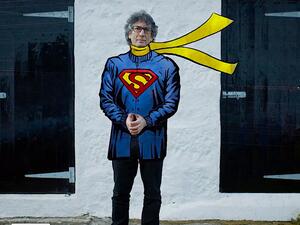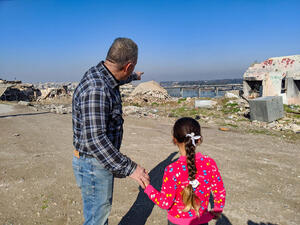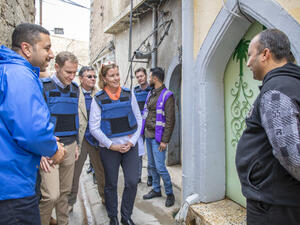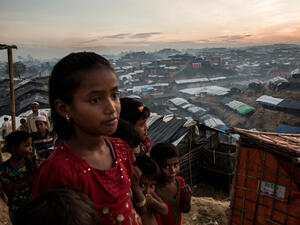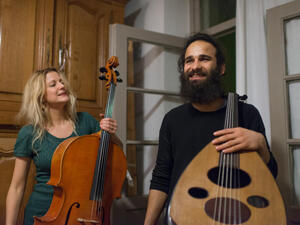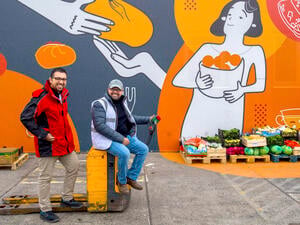UNHCR concerned about the challenges facing thousands of Iraqis fleeing Ramadi
UNHCR concerned about the challenges facing thousands of Iraqis fleeing Ramadi

UNHCR is concerned about the processing arrangements in place at the Bzabz bridge – a series of pontoons across the Euphrates River which marks the boundary between Anbar province and the capital, Baghdad.
GENEVA, April 21 (UNHCR) - The UN refugee agency on Tuesday reported that Iraqi civilians fleeing violence in Ramadi face numerous challenges, including dwindling resources, checkpoints, entry restrictions and security procedures to navigate on their journeys to safety.
An estimated 114,000 Iraqis have fled Ramadi, located in Iraq's restive Anbar province, over the past two weeks as conflict between government forces and extremists intensified. Of these, about 39,000 remain inside the province - many unable to move further afield.
Some 54,000 have gone to Baghdad, 15,000 to Sulaymaniyah in the Kurdistan region of Iraq, and 2,100 people have fled to Babylon. Other people are still on the move trying to reach safety and at least 900 have reached Diyala.
Inside Anbar province, the displaced are seeking shelter wherever they can find it in places such as Khalidiya, Al-Habaniyah and Amriyat Al Fallujah. Here, they stay with relatives, host families or seek shelter in mosques and schools. In one community centre in Al Habaniya, people already displaced by previous waves of violence are sharing their space with new arrivals, resulting in overcrowding - in some cases up to four families are sharing one tent.
"We are also concerned about the processing arrangements in place at the Bzabz bridge - a series of pontoons across the Euphrates River, about 65 kilometres west of Baghdad, which marks the boundary between Anbar and the capital," UNHCR spokesman Adrian Edwards told journalists in Geneva.
Here, civilians fleeing Anbar are asked to provide a sponsor to vouch for them before being admitted to Baghdad or allowed to travel further towards Sulaymaniya. An estimated 1,200 people (200 families) were still waiting to cross when the UN visited on Sunday, and those observed crossing had slowed to a trickle.
People waiting on the Anbar side have no shelter and face worsening conditions. The newly displaced are exhausted and anxious to move on to more secure locations. Some people have walked for miles without food and water.
UNHCR has distributed mattresses, blankets, kitchen utensils, hygiene sets, fans and coolers to some 8,000 people in Ameriyat Al Fallujah and Baghdad in recent days. More aid distribution is under way and UNHCR expects to reach another 12,000 people with emergency relief kits in the coming days. UNHCR field teams continue to conduct assessment missions to locations hosting displaced people where access is possible.
"We are also liaising with the Iraqi authorities, advocating for them to ease restrictions on the movement of people to safe areas. While more people have been able to move into Baghdad in recent days, reports overnight suggest many displaced people are now waiting in Diyala trying to cross into the Kurdistan region of Iraq," Edwards said.
Some 2.7 million Iraqis have become internally displaced across Iraq since January 2014, including 400,000 in Anbar province. They join the ranks of an earlier caseload of more than 1 million Iraqis displaced in previous waves of conflict over the past decade.

